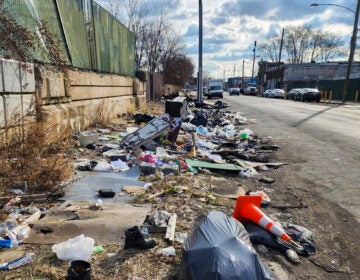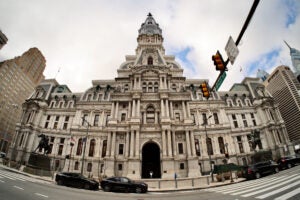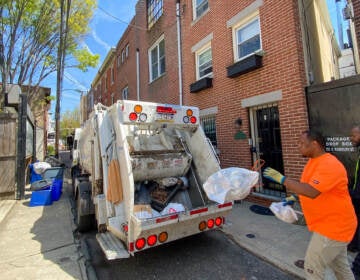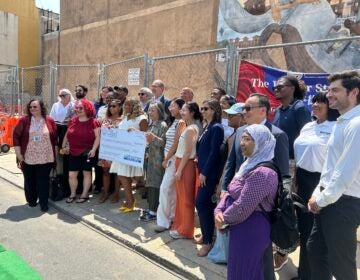Residents say twice-weekly pickups aren’t fixing Philly’s trash problem
The mayor’s pilot program adding another trash day in Center City and South Philly was meant to reduce litter — but some residents say the problem has only gotten worse.
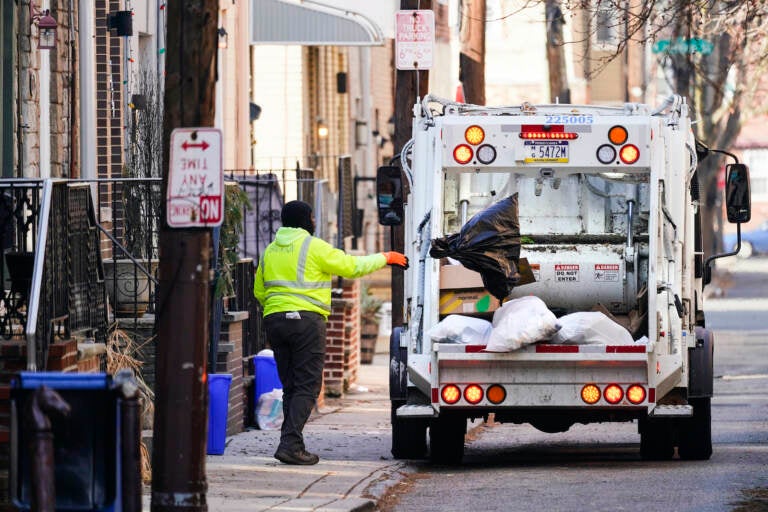
A municipal sanitation worker collects trash in Philadelphia, Thursday, Jan. 13, 2022. (AP Photo/Matt Rourke)
From Philly and the Pa. suburbs to South Jersey and Delaware, what would you like WHYY News to cover? Let us know!
Steven Mavros and his wife were walking along 22nd Street in Philadelphia the other day, taking their kid to daycare, when he noticed something — the streets were filthy.
“Every single block from South Street all the way to Chestnut Street had a ton of detritus that was just everywhere,” Mavros said, adding that his son, who was on a scooter, was forced to constantly weave around the obstacle course of trash. “Like, I didn’t want him to have to deal with that. And for us, it was just a marked difference from what our walk normally is.”
For anyone who’s familiar with Philadelphia’s longtime litter problem, this might not seem surprising — except for one thing: Just a few weeks before, the city had launched a new pilot program aimed at exactly this problem, adding a second trash pickup day per week to neighborhoods in Center City and South Philly.
The initiative is part of Mayor Cherelle Parker’s larger goal of creating a “clean and green” city. But Mavros, who’s lived in Philadelphia for 24 years, said he was skeptical of the initiative from the beginning, because trash days can be a messy affair in the city — and he believes his skepticism has been born out.
“I had a feeling based on what I already saw happening — every time trash was put out, loose trash goes everywhere,” he said. “If you’re just flinging bags from one side of the block into a truck, there’s going to be some stuff that falls out, and no one’s picking that up. And if no one picks that up, it’s just going to keep building and building.”
‘Overworked and underfunded’
Mavros isn’t the only one who saw this coming. In a piece published last month in The Philadelphia Citizen, Nicolas Esposito predicted the current outcome, writing, “I also fear that adding a second round of trash trucks each week will only increase litter. It’s an observable phenomenon that in most neighborhoods, the dirtiest day of the week is trash day, when garbage blows out of bags and cans and trucks often spill out refuse, mysterious liquids and broken glass onto streets.”
“I truly believe Cherelle Parker wants a cleaner Philadelphia — I commend her for that,” Esposito said. “But I think they’re going about it — I know they’re going about it — in the complete wrong way. We cannot clean our way out of this problem.”
Esposito, who currently serves as the director of policy and engagement for Circular Philadelphia, a network aimed at reducing waste, is in a unique position to judge — from 2016-2020, he served as the director of Philadelphia’s now-defunct Zero Waste and Litter Cabinet, which reported to the Streets Department. And during that time, he learned a lot about the source of our city’s trash problem, and how our sanitation system works — or, in some cases, doesn’t work.
“I saw as I worked with the Streets Department and Sanitation — it’s a very mismanaged department, and morale is extremely low,” he said, adding that sanitation workers are among the city’s lowest-paid employees. “They’re so overworked and they’re so underfunded.”
The Streets Department no longer manages sanitation; trash collecting is now under the purview of the recently created Sanitation Department, which didn’t respond to requests for comment at the time of publishing.
That alone, Esposito said, can hobble the city’s ability to pick up trash reliably and on time.
“When you don’t have enough people to run routes on trash, you’re going to have very sloppy collections,” he said. “Things are going to get all over the place and it’s going to be a mess.”
It can also mean missed pickups, which Esposito says happens constantly in his Fishtown neighborhood, resulting in trash bags sitting outside for days, animals tearing them open and trash being scattered.
But lack of funding and a shortage of workers is just the tip of the iceberg, according to Esposito. A lot of the city’s problems with litter go even deeper.
Systemic problems
In 2019, the Zero Waste and Litter Cabinet released a litter index report that surveyed the city neighborhood by neighborhood and block by block in order to pinpoint problem areas, and try to come up with data-based solutions.
One of the first things Esposito learned from the index was that the city’s trash problem isn’t driven by pedestrian litterbugs, tossing cups and wrappers as they walk (although that also happens) — the main culprit is household garbage.
“You see a street, and on that street, there’s a gallon jug of milk and a laundry detergent thing and, you know, a tin can of coffee,” Esposito said. “People weren’t just like drinking a gallon of milk and were going to do their laundry and decided to just litter those things on the street — that’s not what happened. My premise is, and especially after seeing the initial data, is that a lot of the trash that we’re seeing is just by poor trash collection and waste management practices that we have in this city.”
One big problem, he said, is how we store and set out our trash.
“Because we live in these tall, tight row houses, we don’t really have a lot of place for trash storage,” he said. “We don’t put them in trash cans. Our recycling bins don’t have lids on them. So you’re putting this recycling bin out and it just gets knocked over and stuff spills everywhere.”
Another issue is how that trash gets picked up.
“We haven’t really updated our trash collection system and how we do it for 60 years,” Esposito said. “You know, we run these trucks down these small streets. We stop at every little house.”
As opposed to a city like Milan, which has a population comparable to Philadelphia’s.
“We pick up from 585,000 front doors in the city of Philadelphia — Milan picks up from 55,000,” Esposito said, “because they figured out ways that they can consolidate trash to pick up from fewer pickup points. So the fact that we have this trash truck that stops every 15, 16 feet to go to the next row house is just extremely inefficient.”
And then there’s the fact that we simply have a lot of trash — and not a lot of options for how to dispose of it.
“We just have so much more potential for trash than we did even 10 years ago, 20 years ago, 30 years ago,” he said. “So people need better options.”
Proposed solutions
Esposito’s first fix would focus on a new strategic plan for trash collection.
“This would include mandating lidded bins, creating aggregated collection points and using technology to better plan routes for on-time collection,” he said, adding that although the Philly Stat 360 Hub may tout 100% on-time trash collection, his experience says otherwise.
Which leads to his second recommendation — collecting and actually using data, ranging from another litter index survey to the big belly trash can sensors that are supposed to ping the Sanitation Department when they’re full.
“Data is a big piece that the city doesn’t use really well, which is sad because I know personally that there are people who do data in the city, in the Streets Department and Sanitation, that are very, very smart, dedicated, creative people. And if they were just given the license to do what needed to get done, we would be in a much better place,” Esposito said.
Third, he said we should be reducing the amount of trash we’re putting out by partnering with private companies to create more options for recycling, ranging from food waste to batteries to old clothing.
“A quarter of Philly’s trash stream, residentially, is food waste,” Esposito said. “How amazing would it be like when you use a system like Bennett Compost or Circle Compost, where you get the five-gallon bucket that you put your food in, and it’s airtight so rodents can’t get into it and the smells don’t get out of it, and then they come pick it up once a week?”
And then there are other measures the city could be taking, like devoting part of the Sanitation Department’s budget to crews that come and clean up our streets after trash or recycling has been picked up.
As for Mavros, he said he’s used to Philadelphia’s trash problem — though, over the years, it has been eroding his respect for the city.
“I don’t wanna live in a place surrounded by trash — it makes me think less of the city,” he said. “It just doesn’t make me wanna stay here.”
 This story is a part of Every Voice, Every Vote, a collaborative project managed by The Lenfest Institute for Journalism. The William Penn Foundation provides lead support for Every Voice, Every Vote in 2024 and 2025 with additional funding from The Lenfest Institute for Journalism, Comcast NBC Universal, The John S. and James L. Knight Foundation, Henry L. Kimelman Family Foundation, Judy and Peter Leone, Arctos Foundation, Wyncote Foundation, 25th Century Foundation, and Dolfinger-McMahon Foundation.
This story is a part of Every Voice, Every Vote, a collaborative project managed by The Lenfest Institute for Journalism. The William Penn Foundation provides lead support for Every Voice, Every Vote in 2024 and 2025 with additional funding from The Lenfest Institute for Journalism, Comcast NBC Universal, The John S. and James L. Knight Foundation, Henry L. Kimelman Family Foundation, Judy and Peter Leone, Arctos Foundation, Wyncote Foundation, 25th Century Foundation, and Dolfinger-McMahon Foundation.
To learn more about the project and view a full list of supporters, visit www.everyvoice-everyvote.org. Editorial content is created independently of the project’s donors.

Get daily updates from WHYY News!
WHYY is your source for fact-based, in-depth journalism and information. As a nonprofit organization, we rely on financial support from readers like you. Please give today.




